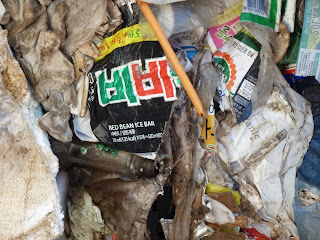Groups Push for Proper Management of Infectious Waste for Public Health and Safety (Littering of Used Rapid Test Kits in Manila Underscores Need to Ensure Sound Management of COVID-19 Waste)
The much publicized littering of used rapid test kits on a street in Sampaloc, Manila has drawn attention to the urgency of monitoring strict compliance to COVID-19 waste management regulations.
According to the EcoWaste Coalition, the used COVID-19 test materials accidentally scattered in M. de la Fuente St. from a punctured trash bag attached to a pedicab should rouse the authorities into conducting random monitoring of compliance to government-issued health care waste management guidelines.
The group’s call for COVID-19 waste management compliance monitoring came after Manila’s Bureau of Permits served a show cause order to CP Diagnostics Center, the pinpointed source of the littered test kits, requiring it to explain why administrative charges should not be filed against the Quiapo-based laboratory.
The city government in its letter said that the facility violated provisions of RA 9003, or the Ecological Solid Waste Management Act and RA 6969, or the Toxic Substances and Hazardous and Nuclear Wastes Control Act.
As per Department Memorandum No. 2020-0170 signed by Health Secretary Francisco Duque III, “all health care wastes generated in the management and treatment of suspect, probable and confirmed COVID-19 patients should be considered as infectious waste.”
Ramon San Pascual, Executive Director of Health Care Without Harm SE Asia said that, "In a public health crisis or not, improperly managed infectious wastes are considered dangerous both for the public and the environment. Whether it is the risk of getting injured or the contamination of soils and bodies of water, infectious waste from hospitals or clinics are harmful when not collected, treated and disposed of safely."
“Random compliance inspections are needed to ensure that the regulated community such as hospitals, clinics, laboratories, quarantine centers, barangay health centers and related facilities are faithfully adhering to the safe management of health care waste, especially during the coronavirus pandemic,” said Jove Benosa, Zero Waste Campaigner, EcoWaste Coalition.
“Facilities that generate COVID-19 wastes should follow infectious waste segregation, storage, collection, transportation and disposal protocols to reduce health and safety risks,” said Benosa.
“As health care wastes generated in these facilities are deemed infectious, facility administrators must ensure that such wastes are managed properly by designated and trained personnel,” he added.
“The responsibility for collecting COVID-19 wastes should not be left in the hands of unauthorized individuals and unaccredited treatment, storage and disposal (TSD) companies,” he pointed out.
TSD facilities, which are accredited by the Environmental Management Bureau, are the facilities where hazardous wastes are stored, treated, recycled, reprocessed or disposed of.
From April to July 2020, the Philippines generated 19, 187.7 metric tons of infectious health care waste based on a special permit to transport submitted by accredited treaters to the EMB.
The list of EMB-accredited TSD facilities can be accessed here: https://emb.gov.ph/wp-content/uploads/2020/06/List-of-TSD-Facilities-May-2020-for-posting.pdf , while the list of DOH-licensed COVID-19 testing laboratories can be viewed here https://hfsrb.doh.gov.ph/?page_id=1729 .
Reference:
https://www.doh.gov.ph/sites/default/files/health-update/dm2020-0170.pdf
https://emb.gov.ph/wp-content/uploads/2016/06/dao20041.pdf




Comments